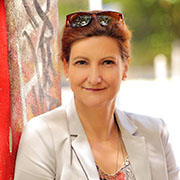„How to respond to Clara Schumann?“ That is the question for fellow composer Charlotte Seither, 146 years younger than Schumann. There’s no question of looking backwards for her.
She was one of the “powerful” women in music history: Clara Schumann, in the limelight as a pianist, composer, and teacher from a young age. On the 200th anniversary of her birth, three cities have launched a special project. Starting out from Zwickau, Robert Schumann’s birthplace, which has long been very active in the promotion of Schumann, Charlotte Seither was commissioned to compose an orchestral work for the anniversary. “sie, die spricht” für Orchester [she who speaks, for orchestra] will be premiered in combination with Clara Schumann’s Piano Concerto and a reconstructed version of Robert Schumann’s “Zwickau Symphony”. Other cities involved are the Schumann city of Bonn with the Beethoven Orchestra and its Music Director Dirk Kaftan, and Frankfurt am Main with a project which recalls her as a famous teacher: in 1878 Joachim Raff, the director of the newly-founded Dr. Hoch’s Konservatorium, appointed Clara Schumann as the very first female professor of piano of all. Now, students are to present several days of projects, as part of which “sie, die spricht” will receive its premiere in collaboration with the Akademie für Tonkunst Darmstadt and the conducting class of the Frankfurt University of Music and Performing Arts.
“How to respond to Clara Schumann?” is the question Charlotte Seither is asking herself about her composition project: “Perhaps in the same way that Robert and Clara took as their principle in their own art: not looking back, referring to the past or even idealizing it. Instead it was their own poetic association, the free musical flow which inspired both musicians in their work. So this is not a topic which becomes the starting point of a new piece here, but rather a musical process of creation: the flowing of an inner stream, beyond rigid norms of form or genre, the devotion to their own sound-creative imagination. In this sense I have also ‘freed’ myself as a composer from an all-too-constricting glance backwards. The poet speaks. Anyone who extols the word and expresses their own language with it begins to speak.”
Marie Luise Maintz
(from “[t]akte” 1/2019)



